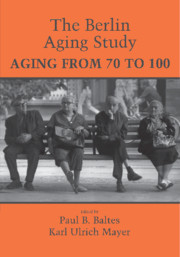Book contents
- Frontmatter
- Contents
- Acknowledgments
- Introduction
- Part A Theoretical Orientations and Methods
- 1 The Berlin Aging Study (BASE): Sample, Design, and Overview of Measures
- 2 Sample Selectivity and Generalizability of the Results of the Berlin Aging Study
- 3 Generational Experiences of Old People in Berlin
- 4 Six Individual Biographies from the Berlin Aging Study
- Part B Major Results from the Four Research Units
- Part C Interdisciplinary Findings
- Part D Overview and Outlook
- Notes on Contributors
- Abbreviations
- Author Index
- Subject Index
3 - Generational Experiences of Old People in Berlin
Published online by Cambridge University Press: 06 December 2010
- Frontmatter
- Contents
- Acknowledgments
- Introduction
- Part A Theoretical Orientations and Methods
- 1 The Berlin Aging Study (BASE): Sample, Design, and Overview of Measures
- 2 Sample Selectivity and Generalizability of the Results of the Berlin Aging Study
- 3 Generational Experiences of Old People in Berlin
- 4 Six Individual Biographies from the Berlin Aging Study
- Part B Major Results from the Four Research Units
- Part C Interdisciplinary Findings
- Part D Overview and Outlook
- Notes on Contributors
- Abbreviations
- Author Index
- Subject Index
Summary
In this chapter we discuss those characteristics of the participants in the Berlin Aging Study which can be attributed to their belonging to different birth cohorts. We ask whether general trends in societal development can be discerned by examining the educational achievement, employment and occupational careers, family formation, and health impairments of three cohort groups (born 1887–1900, 1901–10, and 1911–22). We further investigate the differential effects of historical events and periods, in particular the two world wars and the Great Depression, and examine how these effects are still perceptible in old age. We would like to highlight two of the many descriptive findings. First, the younger cohorts did not have more successful career paths than the older ones. Although the younger men and women had a better education, they were hit harder by historical events, and ended their careers on the same level as the older cohorts. Second, we invalidate the myth of the “golden age” where large families cared for the oldest cohorts. In fact, older cohorts more often remained single, had less children, and were at a higher risk of losing their children at an early age.
Introduction
The Berlin Aging Study (BASE) focuses both on the present situation of elderly people and on the correlates and determinants of aging processes. However, the older adults observed in the study are characterized not only by their age, but also by being members of certain birth cohorts, and sharing the collective life history of their generation.
- Type
- Chapter
- Information
- The Berlin Aging StudyAging from 70 to 100, pp. 83 - 110Publisher: Cambridge University PressPrint publication year: 1998



